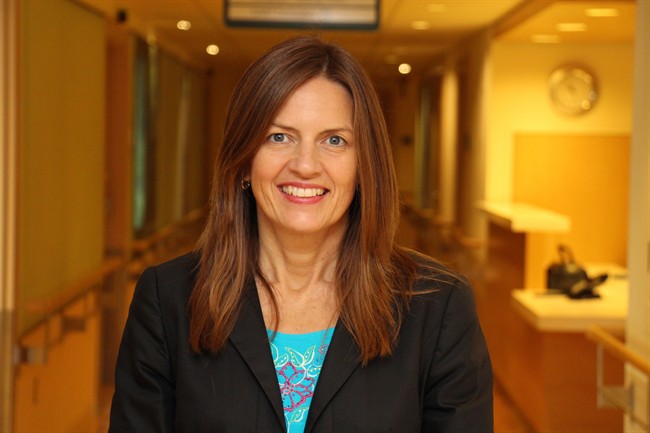TORONTO – A widespread perception of palliative care as being synonymous with death is preventing many patients from accessing supportive therapies aimed at improving their quality of life, researchers say.

In a study published Monday in the Canadian Medical Association Journal, researchers found that cancer patients referred for early palliative care tended to view the concept as frightening and a sure sign they were dying.
But principal researcher Dr. Camilla Zimmermann, head of palliative care at the University Health Network in Toronto, said the service is intended to provide pain relief and other symptom control from the point of diagnosis through the course of a patient’s illness.
READ MORE: Majority of Canadians support assisted dying, poll suggests
Zimmermann said there’s a disconnect between the World Health Organizations’s definition of palliative care — the use of various therapies to improve quality of life for both patients with a life-threatening illness and for their families — and many people’s beliefs about what the term means.
“I think attention needs to be paid to this because palliative care is something that can help so many people and there are people who are not accessing it because they’re afraid of it,” she said.
“It’s like being afraid of the umbrella rather than the storm, because we’re really trying to protect people from suffering.”
Zimmermann said not all patients referred for palliative care end up dying from the disease for which they are being treated, and some may live for several years following diagnosis.
“We might not know at the beginning if that life-threatening illness is going to be the cause of death for that person or not. But anyone with a serious illness has concerns related to symptom control. They often need emotional support, spiritual support, social support in terms of helping their families and maybe caregivers at home, or they may have financial needs.

Get weekly health news
“So regardless of whether the patient is actually actively dying, they need support for all these things.”
READ MORE: A 29-year-old U.S. woman diagnosed with terminal brain cancer plans to end her life on Nov. 1
Palliative care is relevant for patients with a number of illnesses besides cancer, including heart failure, chronic obstructive pulmonary disease, neurological disorders such as ALS (amyotrophic lateral sclerosis) or even dementia, she said.
“So any disease may result in death, but that death may not occur for a very long time.”
To conduct the study, researchers interviewed 48 patients with advanced cancers and 23 caregivers who had participated in an earlier investigation of 461 patients. In the first study, half the participants received early palliative care at an out-patient clinic, in addition to cancer treatment. The other half received only cancer care.
Participants had an estimated survival prognosis of between six months and two years. The 2014 study showed improved quality of life for those who received early palliative care.
Both groups in the follow-up study initially viewed “palliative care” as a frightening term they equated with a loss of hope, with incapacity and “it being a place where you go to die, a place you never get out of again,” said Zimmermann. She added that some weren’t clear what the term meant.
After the four-month study, the group enrolled in palliative care shifted their view and saw the service as beneficial to their quality of life, while the group that didn’t get the supportive care continued to find the concept alarming.
Patients in both camps found the label “palliative care” extremely stigmatizing and said they wouldn’t use the term when speaking of their treatment with family or friends.
READ MORE: SARS doctor Donald Low urges Canadians to legalize assisted suicide in posthumous message
Participants said the stigma primarily arises from the medical system, with doctors and nurses giving the impression that palliative care was only end-of-life care, explained Zimmermann. She added that the mainstream media and social media tend to perpetuate that notion.
Many believed the expression should be changed to “supportive care” and the service should undergo a rebranding to better reflect what it offers.
In an accompanying commentary, Dr. Anthony Caprio, a geriatric medicine specialist at the Carolinas HealthCare System in Charlotte, N.C., said altering the name may help promote a more positive view of palliative care.
But, he added, “the stigma will persist if this type of care is recommended only as default treatment when curative or life-prolonging treatments are deemed ineffective or undesired.”
If palliative care is viewed as an essential component of advanced disease management, then its benefits should be available and recommended to all patients at every stage of their illness, Caprio wrote.
“Palliative care would no longer be chosen; it would simply be integrated into comprehensive oncology treatment that supports patients and caregivers by incorporating palliative-care principles and services into all aspects of their care.”
Zimmermann said addressing negative perceptions about palliative care is particularly timely, given that medical aid in dying is soon to be fully legalized in Canada, against a background recognition that supportive services for people with potentially life-limiting illnesses are inadequate or non-existent in many parts of the country.
“There’s the fear that some people might be able to easily access physician-assisted death who don’t have access to palliative care,” she said. “And we would never want someone to choose assisted death without having experienced palliative care.”







Comments
Want to discuss? Please read our Commenting Policy first.